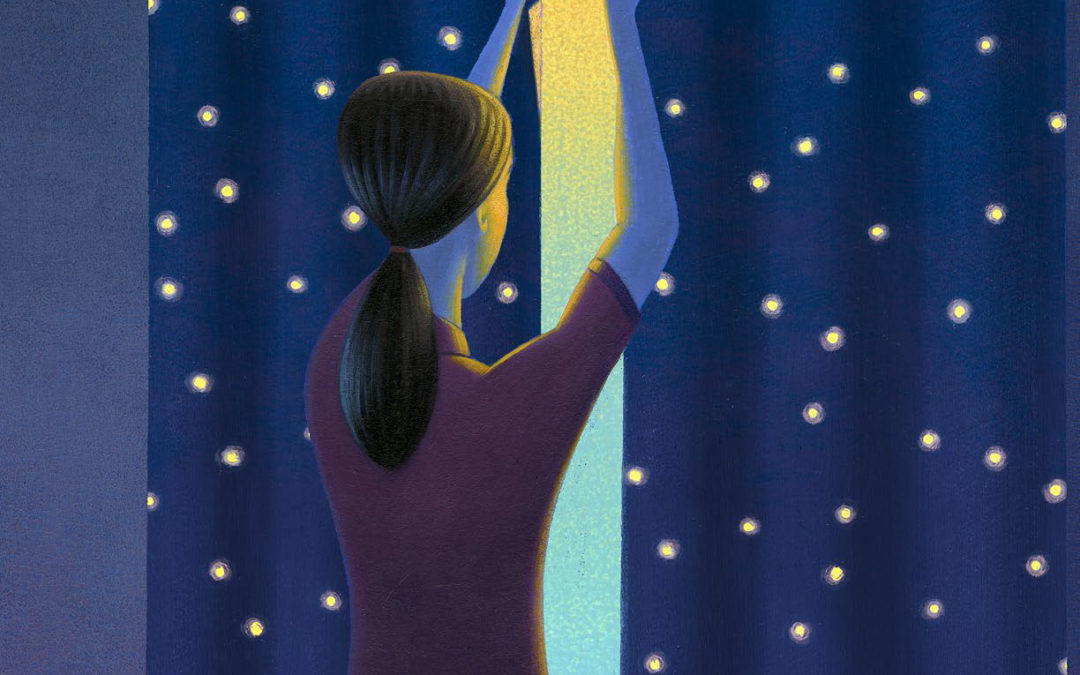by Sarah Carson—
I vividly remember the moment that summer began to turn to fall this year. My daughter and I were in the car when I spotted a patch of red leaves high above the road. “Uh oh,” I said.
“What, Momma?” my daughter asked.
“That tree is turning red. It thinks summer is over.” As soon as the words left my mouth, I realized my mistake.
At the age of 3, my daughter is already a sensitive soul. “Summer is over?” she asked, her tiny voice quivering.
I quickly tried to backtrack—explaining, yes, summer was ending, but fall would also be fun. And then the snow would come, and we’d sled and ice skate and light fires in the woodstove. Eventually green leaves would return, along with flowers, birds and bike rides to the ice cream shop…but the damage was done. My words had already painted the future as bleak. “Summer is over,” I’d said. What she had heard was: “What’s to come won’t be nearly as fun as what we’ve already so thoroughly enjoyed.”
“Rooted in the promises of God in Jesus Christ, we do not need to be afraid to face the future,” Meghan Johnston Aelabouni writes in this month’s Bible study (p. 18). The biblical perspective on the future “both comforts us and calls us,” she says. How we live in the “now” affects who we become.
How do you live in the now? Do you, like author Julia Seymour, try to live with gratitude? “A grateful heart for God’s steadfast love sets us up to be able to perceive God’s enduring grace,” she writes (p. 6). “Being grateful in the present guides us to prepare for the future, creates memories and sets our prayers on God’s promises.”
Or, like me, are you clinging to what you have with trepidation about what’s to come?
Or are you gritting your teeth until the present is over? Do you feel like Helen Hollingsworth did about one aspect of a long-ago trip: “I considered this my way of ‘suffering for Christ’” (p. 32)?
Even with Thanksgiving approaching, this year’s events may have made it difficult to feel thankful. We’ve lived through an international pandemic, a fraught political landscape, and more and more evidence of racial injustice. It’s difficult not to see a patch of red in the trees and think, “All this, and now summer is over too.”
But the way we view our current circumstances affects how we walk into the future. “Jesus was eminently practical and present in the moment,” Anna Madsen reminds us (p. 28). “‘Today,’ he said—not tomorrow, not after you die, but today—‘salvation has come to you.’”
When we look upon the present with gratitude, we enter the future with hope and generosity. “Look at that beautiful patch of red leaves,” I wish I’d said. “We’ve had the gift of summer, and now we’ll get to see the fall.” “Holy time” affords us the opportunity to learn from each passing moment. Maybe I didn’t say or do exactly the thing I wish I had. Maybe I have not yet fully acted with justice and love, in all the ways I have been called.
Hope is not lost. The future is not written. Now is the moment to act. The choices we make today have the power to shape what’s ahead.
Sarah Carson is managing editor of Gather.
This article is from the November 2020 issue of Gather magazine. To read more like it, subscribe to Gather.



This Thanksgiving season offers us an opportunity to express our gratitude for the gifts of good health, much happiness and prosperity. This pandemic has greatly impacted our neighbors and we need to reach out and share from the gifts we have been given.
God forgives us , we have to forgive ourselves too
Yes, we must each include ourselves in our circle of care.
So true. Agree with the writer wholeheartedly.
You said the future is not written, but I always thought God knows our future and our time on earth is written. How do we shape or change our future if it’s predetermined?